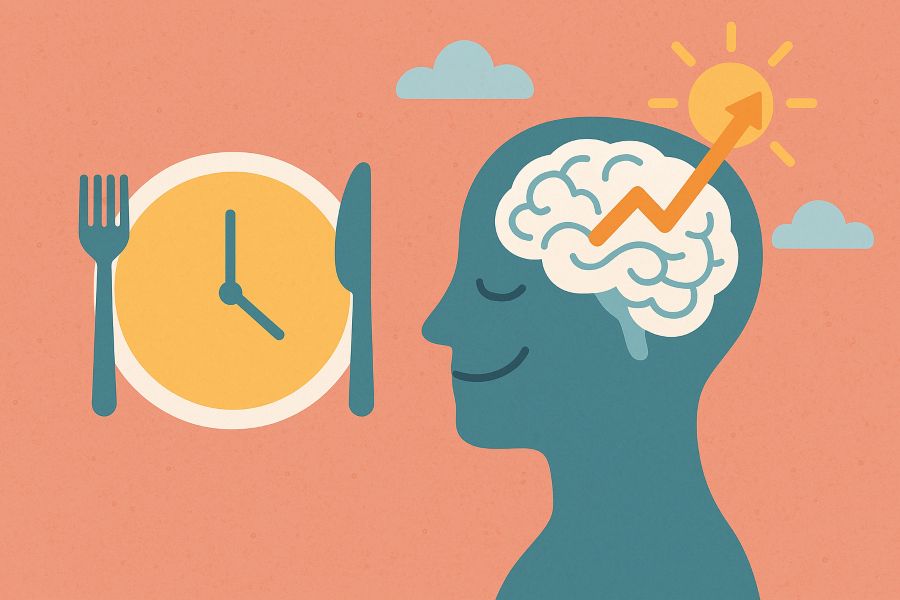Hey there, wellness seekers! If you’ve ever considered fasting, you might already know about its potential for weight loss or physical detox. But did you know that fasting benefits extend far beyond the body, reaching deep into the realm of mental health? Today, we’re diving into the fascinating connection between fasting and mental well-being. Whether you’re a seasoned faster or just curious about intermittent fasting benefits, this post will explore how taking a break from food can nourish your mind, reduce stress, and even enhance your mood. Let’s unpack the science, share practical tips, and get you inspired to try fasting for mental clarity and emotional balance.
What Are the Fasting Benefits for Mental Health?
Fasting, in its various forms like intermittent fasting (IF) or time-restricted eating, isn’t just a trend—it’s a practice rooted in centuries of tradition and now backed by modern science. When we talk about fasting benefits, mental health often takes center stage in recent research. Studies suggest that fasting can positively influence brain function, mood regulation, and stress resilience. For instance, fasting triggers a process called autophagy, where cells clean out damaged components, which may protect brain cells from degeneration (Mattson et al., 2017). This cellular “spring cleaning” could play a role in reducing symptoms of anxiety and depression. Beyond that, fasting also impacts hormones like serotonin and dopamine, which are critical for emotional well-being. So, when you fast, you’re not just resting your digestive system—you’re potentially rewiring your brain for better mental health.
How Fasting Boosts Brain Health and Cognitive Function
One of the most exciting fasting benefits is its impact on brain health. When you fast, your body shifts into a state of ketosis, where it burns fat for fuel instead of glucose. This metabolic switch produces ketones, which are not only an efficient energy source for the brain but also have neuroprotective effects. Research shows that ketones may enhance cognitive function and even reduce the risk of neurodegenerative diseases like Alzheimer’s (Cunnane et al., 2016). Additionally, fasting increases the production of brain-derived neurotrophic factor (BDNF), a protein that supports the growth of new neurons and strengthens neural connections (Mattson et al., 2018). Imagine fasting as a workout for your brain—challenging it to adapt and grow stronger. Whether you’re looking to sharpen your focus or protect your mind as you age, the cognitive fasting benefits are hard to ignore.
Fasting as a Tool for Stress and Anxiety Reduction
Life can be overwhelming, and stress often feels like an uninvited guest that just won’t leave. Here’s where fasting benefits for mental health really shine. Fasting has been shown to lower cortisol levels, the primary stress hormone, helping to calm the body’s fight-or-flight response (Fond et al., 2013). When you’re not constantly digesting food, your body can redirect energy toward repair and recovery, including balancing your nervous system. Plus, fasting promotes mindfulness—when you’re intentional about when and what you eat, you’re more likely to tune into your body’s signals. I’ve personally found that intermittent fasting helps me pause and reflect, almost like a mini-reset for my mind. If you’re battling stress or anxiety, exploring fasting health benefits could be a game-changer.
- Start with a gentle fasting schedule, like the 12:12 method (12 hours fasting, 12 hours eating), to ease into the practice.
- Pair fasting with stress-relief activities like deep breathing or journaling to amplify mental health benefits.
- Stay hydrated during fasting windows—dehydration can worsen stress, so sip water or herbal tea.
- Listen to your body; if fasting feels too intense, adjust your approach or consult a healthcare provider.
Can Fasting Improve Mood and Emotional Balance?
Ever notice how your mood can tank after a heavy meal or a sugar crash? Fasting offers a different approach by stabilizing blood sugar levels and reducing inflammation, both of which are linked to mood swings. The mental health fasting benefits include potential improvements in symptoms of depression, thanks to fasting’s effect on neurotransmitter activity. A study found that intermittent fasting may enhance serotonin signaling, a key player in happiness and emotional stability (Li et al., 2014). Additionally, fasting can foster a sense of control and accomplishment—sticking to a fasting plan often boosts self-esteem and emotional resilience. While it’s not a cure-all, incorporating fasting into your routine might just lift your spirits in ways you didn’t expect.
Practical Tips to Maximize Fasting Benefits for Mental Health
Ready to tap into the fasting benefits for your mind? It’s not about jumping into a 3-day water fast right away (unless you’re experienced and medically cleared). Start small and build a sustainable practice that supports both your mental and physical health. Fasting should feel empowering, not punishing. I’ve learned through trial and error that preparation and mindset are everything. Below are some actionable tips to help you get started and make the most of the mental clarity fasting benefits. Remember, everyone’s body responds differently, so tweak these suggestions to fit your lifestyle.
- Choose the right fasting method: Intermittent fasting (like 16:8, fasting for 16 hours and eating during an 8-hour window) is beginner-friendly and still offers mental health perks.
- Time your fasts wisely: Align fasting windows with your natural energy dips, like overnight, to minimize hunger stress.
- Focus on nutrient-dense meals: Break your fast with foods rich in omega-3s, vitamins, and minerals to support brain health.
- Avoid overdoing it: Extended fasting can sometimes increase irritability—stick to moderate durations unless guided by a professional.
- Track your mood: Keep a journal to note how fasting affects your emotions and adjust as needed for optimal results.
Potential Risks and How to Fast Safely for Mental Health
While the fasting benefits for mental health are promising, it’s not a one-size-fits-all solution. Fasting can be challenging, especially if you have a history of eating disorders, anxiety, or other mental health conditions. For some, restricting food intake might trigger stress or negative thought patterns, so it’s crucial to approach fasting with caution. Research warns that prolonged fasting without proper preparation can lead to fatigue or mood disturbances in certain individuals (Trepanowski et al., 2017). Always consult a healthcare provider before starting, especially if you’re on medication or managing a chronic condition. The goal is to harness the fasting health benefits without compromising your well-being. Start slow, stay mindful, and prioritize balance over extremes.
In wrapping up, it’s clear that the fasting benefits for mental health are more than just hype—they’re grounded in science and real-world experiences. From boosting brain health with ketones and BDNF to reducing stress through hormonal balance, fasting offers a unique way to support your mind. It’s not about deprivation but about giving your body and brain a chance to reset and thrive. Whether you’re curious about intermittent fasting benefits or ready to explore longer fasts, remember to start small, listen to your body, and seek guidance if needed. The journey to mental clarity and emotional balance might just begin with your next fasting window. So, why not give it a try and see how fasting can transform not just your body, but your mind too?
References
- Cunnane, S. C., Courchesne-Loyer, A., St-Pierre, V., Vandenberghe, C., Pierotti, T., Fortier, M., … & Castellano, C. A. (2016). Ketones and brain function: Possible link to neurodegenerative disease. Journal of Alzheimer’s Disease, 50(1), 1-15.
- Fond, G., Macgregor, A., Leboyer, M., & Michalsen, A. (2013). Fasting in mood disorders: Neurobiology and effectiveness. A review of the literature. Psychiatry Research, 209(3), 253-258.
- Li, L., Wang, Z., & Zuo, Z. (2014). Chronic intermittent fasting improves cognitive functions and brain structures in mice. PLoS One, 8(6), e66069.
- Mattson, M. P., Moehl, K., Ghena, N., Schmaedick, M., & Cheng, A. (2018). Intermittent metabolic switching, neuroplasticity and brain health. Nature Reviews Neuroscience, 19(2), 63-80.
- Mattson, M. P., Longo, V. D., & Harvie, M. (2017). Impact of intermittent fasting on health and disease processes. Ageing Research Reviews, 39, 46-58.
- Trepanowski, J. F., Kroeger, C. M., Barnosky, A., Klempel, M. C., Bhutani, S., Hoddy, K. K., … & Varady, K. A. (2017). Effect of alternate-day fasting on weight loss, weight maintenance, and cardioprotection among metabolically healthy obese adults: A randomized clinical trial. JAMA Internal Medicine, 177(7), 930-938.






